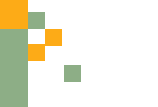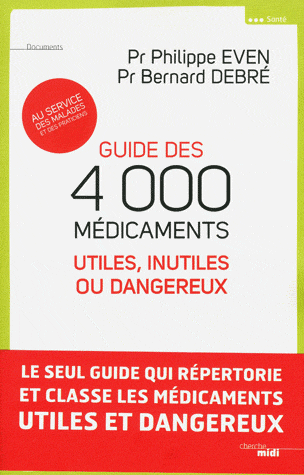 |
||
|
Corporate Drugs |
||
|
The Editor speaks
(book jacket): Spending
1.3 to 2 times higher than those of all other major European countries, 10 to
15 billion euros thrown from windows, no sound health benefits, more than the
deficit Medicare at the expense of real priorities: hospitals, maternity
nurses, physical and mental disability, and old age dependency. This guide is intended primarily for patients and
practitioners to alert and inform them about the effectiveness and risks of
medications. - - - - - - - - -
This
book was widely mentioned in the world
press in Sept. 14, 2012, with criticism, than dropped. This
book is not available in English (as of 4/13/2013). Nor is it listed in
French on Amazon.com, or is
it to be found in a Google search for the title. It is sold for 20.99 euros,
release date
13/09/12, 905 pages, 15.4 cm x 24.1 cm x 4.6 cm Publisher Cherchemidid ISBN: 978-2-7491-2141-3 EAN: 9782749121413,
paperback,
width 1.343 kg. Even
Philippe is a former Dean of the Faculty of Medicine Necker and president of
the Institute Necker. (Necker Institute is a prestigious Bernard
Debré is professor of urology, vice-president of the Institute Necker, a member
of the National Ethics Committee for Research and Life Sciences and a member of
Paris.
|
|||
|
^^^^^^^^^^^^^^^^^^^^^^^^^^^^^^^^^^^^^^^^^^^^^^^^^^^^^^^^^^^^^^^^^^^^^^^^^^^^ Half of France’s drugs are ‘useless’ and five percent are dangerous, a book by two top French doctors
claimed. The duo believes the pharmaceutical
industry is forcing ineffective drugs on the market, costing taxpayers up to
ten billion euros a year. The duo
reviewed 4,000 French drugs and found that 50 percent were ‘useless,’ 20
percent were ‘badly tolerated’ and five percent had adverse effects. Philippe Even, former head of the Necker Hospital in Paris,
and Bernard Debré, doctor and member of parliament for the UMP party, recently co-authored a book titled ‘The
Guide to 4,000 Useful, Useless or Dangerous Medicines.’ The book claimed
that France could save up to ten billion euros a year by halting social
security reimbursements for drugs that are hazardous or have no health value. The
pharmaceutical industry is “the most lucrative, most cynical and least
ethical of all the industries,” Dr. Even said. He claims that in order to
reduce budget shortfalls in France’s healthcare system, “one simply has to
take the dangerous, useless and ineffective medicines off the market.” The
book was written in light of a
Mediator Affaire report Dr. Even and Dr. Debré conducted in 2011 for former
President Nicolas Sarkozy, where they investigated an
incident where some 2,000 people were killed by a prescribed diabetic drug before
the medicine was taken off the market. Their
report stated that the French medical system was in dire need of reform,
spurring Dr. Even and Dr. Debré to write their book. The two made a list of
drugs that pose health
risks, including cardiovascular, anti-inflammatory and anti-smoking drugs, and
contraceptive pills. Statins, drugs taken to lower cholesterol, were
just one of the many drugs found to be “completely useless,” Dr. Even said in an interview with Le Nouvel
Observateur. “[Statins]
are taken by three to five million French people, which costs France two
million euros per year.” “We have to do a big clean-up of our pharmacies,”
Dr. Even told Le
Parisien. “France has a huge public debt and the state can make considerable
savings.” “Meanwhile in the UK, where people take far fewer medicines than us,
people are no less healthy as a result,” he said. The two believe that, while there is no room for ‘useless’
drugs on
the market, people should certainly continue to use effective drugs. “Antibiotics
are the best [medical] discovery of all time,” Even told Le Parisien. “Antiretroviral
drugs have given us a very real lead on AIDS and a large number of anti-cancer
medicines have had an immense impact on our treatment of the disease.” Book blasted by medical establishment: The Professional Federation of Medical
Industrialists (LEEM) criticized the book as un-academic and unclear. The group
argued that the doctors’ assertions could have a destabilizing effect,
needlessly alarming ill patients into ceasing treatments for their
diseases. ^^^^^^^^^^^^^^^^^^^^^^^^^^^^^^^^^^^^^^^^^^^^^^^^^^^^^^^^^^^^^^^^^^^^^^^^^^ Official
French report trashes Pharma, calls many drugs 'useless' September 14, 2012 | By Eric
Palmer A
couple of French medical experts
have some really nasty things to say about Big
Pharma in a book
they were commissioned to
write after the scandal in France over
the weight-loss drug Mediator, which
was tied to hundreds of deaths there. They claim that half the drugs
prescribed to
patients are of no use, or even dangerous, and the government could save €10
billion ($13 billion) a year if it quit paying for them, The Guardian
reports. Bernard Debré, a physician and member of parliament, and Philippe Even,
director of the prestigious Necker Institute, suggest that stopping use of the
drugs could prevent up to 20,000 deaths and reduce hospital admissions by up to
100,000. In their book, "The Guide to the 4,000 Useful, Useless or Dangerous Medicines" they evaluated the costs, effectiveness
and risks of
the drugs available in France, some of which they say "are completely
useless." They are particularly harsh about lipid-regulating statins and
have singled out 58 drugs, that are used for a wide range
of conditions, like diabetes
and osteoporosis,
which they claim are outright dangerous. "The
pharmaceutical industry is
the most lucrative, the most cynical and the least ethical of all the
industries," Even tells The Guardian. "It is like
an octopus with tentacles that
has infiltrated all the decision-making bodies, world health organizations,
governments, parliaments, high administrations in health and hospitals and the
medical profession." Queried
by The Guardian on
why the French rely so heavily on drugs if they are not effective,
Even suggested that they had been brainwashed into
asking for drugs. "Today we have doctors who want to give people
medicines and sick people asking for medicines. There's nothing objective or
realistic about this." |
|||
|
Published in The Guardian, UKs most
respected independent news service © Guardian News and Media
2012 http://www.rawstory.com/rs/2012/09/14/french-doctors-half-of-all-prescribed-medicines-are-useless-or-dangerous/?
By Kim Willsher, The Guardian, Friday, September 14, 2012 13:08 EDT © Guardian News and Media 2012 Half of all medicines being prescribed by doctors in France are either
useless or potentially dangerous for patients, according to two eminent medical
specialists. They blame the powerful pharmaceutical companies for keeping these
drugs on sale at huge expense to the health system and the taxpayer. Professor Philippe Even, director of the prestigious Necker
Institute, and Bernard Debré, a doctor and member of parliament, say
removing what they describe as superfluous and hazardous drugs from the list of
those paid for by the French health service would save up to €10bn (£8bn) a
year. It would also prevent up to 20,000 deaths linked to the medication and
reduce hospital admissions by up to 100,000, they claim. In their 900-page book The Guide to the 4,000 Useful, Useless or Dangerous
Medicines, Even and Debré examined the effectiveness, risks and cost of
pharmaceutical drugs available in France. Among those that they alleged were
“completely useless” were statins,
widely taken to lower cholesterol. The blacklist of 58 drugs the doctors claimed
are dangerous
included anti-inflammatories and drugs prescribed for cardiovascular
conditions, diabetes, osteoporosis, contraception, muscular cramps and nicotine
addiction. The Professional Federation of Medical Industrialists denounced the doctors’
views as full of “confusions and approximations”. “This book is helping to
alarm those who are sick needlessly and risks leading them to stop treatments,”
it said in a statement. Christian
Lajoux, the federation’s president said: “It is dangerous and irresponsible …
hundreds of their examples are neither precise nor properly documented. We must
not forget that the state exercises strict controls on drugs. France has
specialist agencies responsible for the health of patients and of controlling
what information is given to them.” Professor Even told the Guardian most of the drugs criticised in the
book
are produced by French laboratories. He accused the pharmaceutical industry of
pushing medicines at doctors who then push them on to patients. “The
pharmaceutical industry is the most lucrative, the most cynical and the least
ethical of all the industries,” he said. “It is like an octopus with tentacles
that has infiltrated all the decision making bodies, world health
organisations, governments, parliaments, high administrations in health and
hospitals and the medical profession. “It has
done this with the connivance, and occasionally the
corruption of the medical profession. I am not just talking about medicines but
the whole of medicine. It is the pharmaceutical industry that now outlines the
entire medical landscape in our country.” The French consume medication worth around €36bn every year, around
€532 for
each citizen who has an average 47 boxes of medicine in cupboards every year. The state covers 77%
of the cost, amounting to 12% of GDP; in
the UK spending on medicines is 9.6% of GDP. “Yet in the UK people have
the same life expectancy of around 80 years and are no less healthy,” said
Even. The authors were commissioned by former President
Nicolas Sarkozy to write a report over the Mediator
affair, a drug developed for diabetes patients but prescribed as a slimming
aid that has been linked to the deaths of hundreds of patients who developed
heart problems. However, Even accused
the industry of having a get-rich-quick attitude to making medicines and said
it was interested in chasing only easy profits. “They
haven’t discovered very much new for the last 30 years, but have multiplied
production, using tricks and lies. Sadly, none of them is interested in
making drugs for rare conditions or, say, for an infectious disease in
countries with no money, because it’s not a big market. Nor are they interested
in developing drugs for conditions like Alzheimer’s or Parkinson’s disease
because it too difficult and there’s not money to be made quickly. It
has become interested only in the
immediate, in short term gains. On Wall Street, the pharmaceutical industry is
third after petrol and banking, and each year it increases by 20%. It’s more
profitable than mining for diamonds.” Asked
to explain French people’s apparent dependence on medication, Even said: “For
the last 40 years patients have been told that medicines are necessary for
them, so they ask for them. Today we have doctors who want to give people
medicines and sick people asking for medicines. There’s nothing objective or
realistic about this.” He added: “There is nothing
revolutionary in this book. This has all been known for some time.” ^^^^^^^^^^^^^^^^^^^^^^^^^^^^^^^^^^^^^^^^^^^^^^^^^^^^^^^ The
book of 900 pages and lists, according to the Nouvel
Observateur , "50%
of unnecessary drugs, 20 %
Of poorly tolerated, 5 %
Of 'potentially dangerous', but incredible paradox, 75 %
Are reimbursed. "Their delisting
would yield between 10 and 15 billion euros to Social Security. Prof. Even
attacks especially statin drugs against cholesterol,"
swallowed by 3 to 5
million French " costing "on
France 2 billion per year," and
he considers "completely
unnecessary." Enter supporting content here |
|||
